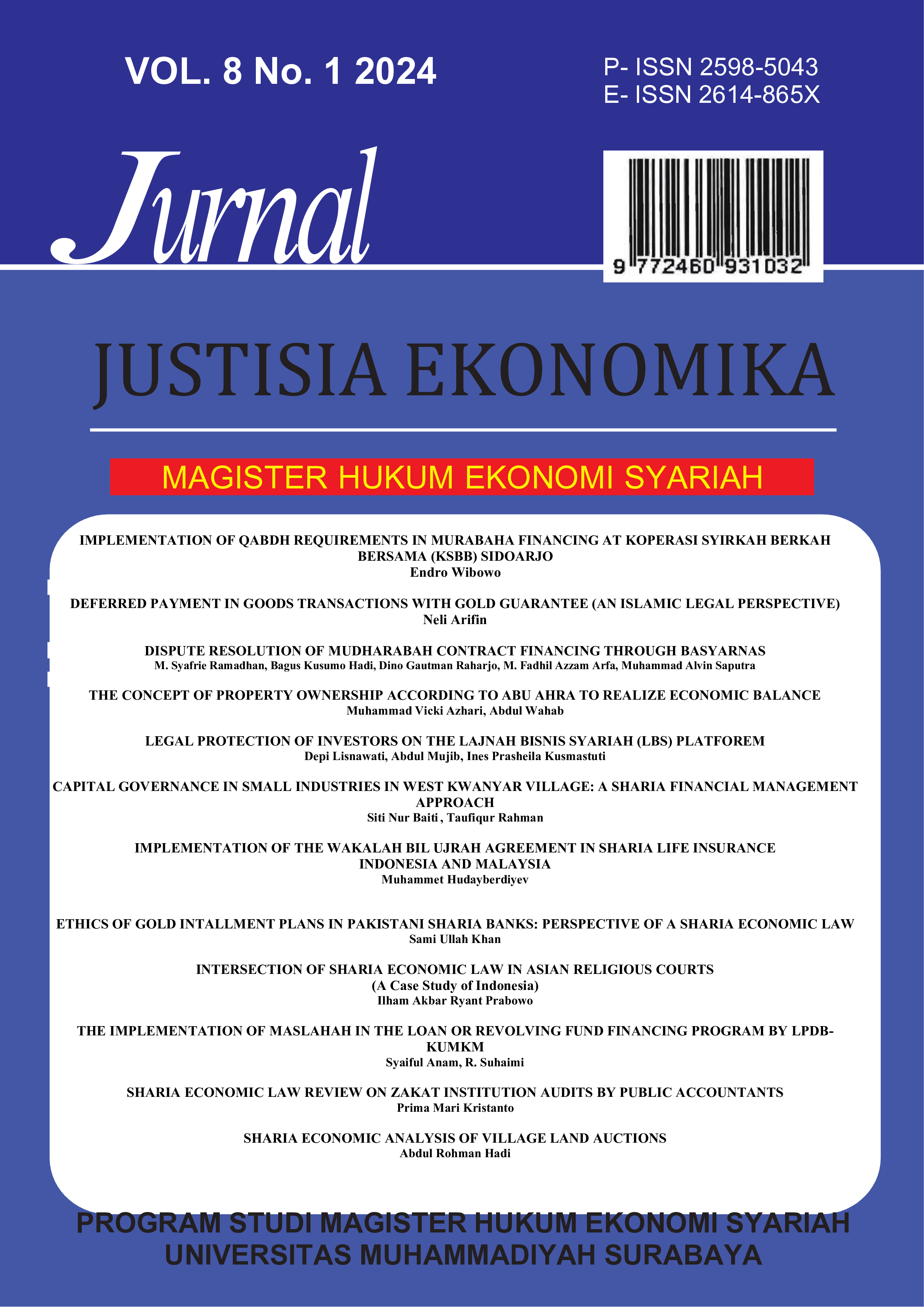IMPLEMENTATION OF QABDH REQUIREMENTS IN MURABAHA FINANCING AT KOPERASI SYIRKAH BERKAH BERSAMA (KSBB) SIDOARJO
DOI:
https://doi.org/10.30651/justeko.v8i1.20065Keywords:
Murabaha, Qabdh, Sharia ComplianceAbstract
One of the financing procedures that are not by Sharia principles in Murabaha financing is the practice of selling goods by an Islamic Financing Institution before they are owned to financing customers. Seeing this phenomenon, Koperasi Syirkah Berkah Bersama (KSBB) took the initiative to become a Sharia financial institution capable of serving its members through Murabaha financing by really paying attention to Sharia compliance, especially from the aspect of implementing handover or qabdh in Murabaha financing. The purpose of this study is to find out how the implementation of handover or qabdh in Murabaha financing and the analysis of sharia compliance with this implementation at KSBB Sidoarjo. The research method used in this study is qualitative research with a case study approach. The data analysis technique used is descriptive-qualitative analysis. The research data comes from interviews with several informants and documents related to Murabaha financing at KSBB. The data that has been obtained is analyzed and compared with related theories. The results of this research indicate that in the process of Murabaha financing at KSBB, the management of KSBB does not represent members in purchasing the goods submitted to suppliers. KSBB also ensures that the goods are fully controlled before being sold to members who apply for financing. The entire Murabaha financing process at KSBB, especially from the qabdh aspect, does not violate sharia compliance set by the DSN MUI.
References
Ahmed, Mezbah Uddin, Ruslan Sabirzyanov, and Romzie Rosman. “A Critique on Accounting for Murabaha Contract.” Journal of Islamic Accounting and Business Research 7, no. 3 (2016): 190–201. https://doi.org/10.1108/jiabr-04-2016-0041.
Anggraini, Muhammad Hasan Rina, and Muhammad Zulkarnain. Ekonomi Koperasi. Edited by Syaiful Bahri. Bandung: Media Sains Indonesia, 2022.
Anwar, Amelia, Hud Leo, and Perkasa Maki. “Analisis Implementasi Akad Murabahah Dan Fatwa Ulama Terhadap Perkembangan Perbankan Syariah Di Indonesia.” Adzkiya : Jurnal Hukum Dan Ekonomi Syariah 6, no. 2 (February 19, 2019). https://doi.org/10.32332/ADZKIYA.V6I2.1279.
Authors, For. “International Journal of Islamic and Middle Eastern Finance and Management.” Managerial Finance 34, no. 10 (2008). https://doi.org/10.1108/mf.2008.00934jaa.001.
Bait, Ammi Nur. “Mengenal Taqabudh (Serah Terima).” Accessed February 25, 2023. https://pengusahamuslim.com/7425-mengenal-taqabudh-serah-terima.html.
Baqi, Muhammad Fuad Abdul. Himpunan Hadits Shahih Disepakati Oleh Bukhari Dan Muslim. Edited by Salim Bahreisy. Surabaya: Bina Ilmu, 2003.
Firdausi, Carunia Mulya. Koperasi Dalam Sistem Perekonomian Di Indonesia. Jakarta: Yayasan Pustaka Obor Inodonesia, 2019.
Indonesia, Fatwa Dewan Syariah Nasional Majelis Ulama. Akad Jual Beli, 1 § (2017).
Kurniawan, Anang Mury, and Widyaiswara. “Aspek Perpajakan Transaksi Murabahah Pasca Perubahan Undang-Undang Perpajakan.” Badan Pendidikan dan Pelatihan Kementrian Keuangan, 2010. https://bppk.kemenkeu.go.id/sekretariat-badan/berita.
Majah, Muhammad Ibnu. “Sunan Ibn Majah,” n.d. https://www.prophetmuhammad.com/ibnmajah/2187.
Manzhur, Ibnu. “Qamus Lisan Al Arabi.” Accessed June 10, 2023. https://www.almaany.com/ar/dict/ar-ar/باع/?c=لسان العرب.
Miah, Mohammad Dulal, and Yasushi Suzuki. “Murabaha Syndrome of Islamic Banks: A Paradox or Product of the System?” Journal of Islamic Accounting and Business Research 11, no. 7 (2020): 1363–78. https://doi.org/10.1108/JIABR-05-2018-0067.
Murshid, Fadillah. “Kebijakan Regulasi Baitul Maal Wat Tamwil (BMT) Di Indonesia.” Jurnal Kajian Syari’ah Dan Masyarakat 18, no. 2 (2018): 9–30.
Penyusun, Tim. Standar Produk Perbankan Syariah Murabahah. Edited by Setiawan Budi Utomo. Jakarta: Otoritas Jasa Keuangan Syariah, 2019. https://www.ojk.go.id/id/kanal/syariah/berita-dan-kegiatan/publikasi/Documents/Pages/Buku-Standar-Produk-Perbankan-Syariah-Murabahah/Buku Standar Produk Murabahah.pdf.
“Profil KSBB,” n.d. https://ksbb.co.id/.
Subaily, Yusuf al. Fiqh Perbankan Syariah: Pengantar Fiqh Muamalat Dan Aplikasinya Dalam Perekonomian Modern. Edited by Erwandi Tarmizi, n.d.
Tirmidzi, Muhammad bin Isa at. Jami` At-Tirmidhi. Vol. 1, Bo., n.d. https://sunnah.com/tirmidhi:1234#:~:text=’Amr bin Shu’aib narrated, one does not have.’%22.
Tlemsani, Issam, Farhi Marir, and Munir Majdalawieh. “Screening of Murabaha Business Process through Quran and Hadith: A Text Mining Analysis.” Journal of Islamic Accounting and Business Research 11, no. 9 (2020): 1889–1905. https://doi.org/10.1108/JIABR-05-2020-0159.
Umar, Ahmad Mukhtar. “Mu’jam Al Lughah Al ’Arabiyyah Al Mu’ashirah.” Accessed July 19, 2023. https://www.almaany.com/ar/dict/ar-ar/قبض/.
“Undang-Undang RI No. 25 Tahun 1992 Tentang Perkoperasian Indonesia.” 1992. https://www.dpr.go.id/dokjdih/document/uu/783.pdf.
Mufti Hassan Ashraf Usmani, Ali Usmani, Mufti Uzair Ashraf Usmani, and Hassan Ali. “Issues of Possession in Murabaha Financing.” COMSATS Journal of Islamic Finance 4, no. 2 (2019): 81–93. https://doi.org/10.26652/cjif.4201925.
Yin. Studi Kasus: Desain Dan Metode. Jakarta: PT. Raja Grafindo, 2000.
Downloads
Published
How to Cite
Issue
Section
License
HAK CIPTA
Penulis yang mengirimkan artikel dalam jurnal Justisia Ekonomika harus memahami dan menyetujui persyaratan tentang hak cipta jurnal Justisia Ekonomika sebagai berikut:
1. Hak Cipta tulisan / artikel yang diterbitkan di jurnal Justisia Ekonomika otomatis menjadi hak pengelola jurnal atau publisher
2. Meskipun Hak Cipta atas tulisan yang telah diterbitkan di jurnal Justisia Ekonomika adalah menjadi haknya publisher, tetapi penulis masih mempunyai hak untuk : a). Penulis boleh meng-upload di repository kampus, b). Penulis boleh meng-upload di webnya sendiri, c). Penulis boleh meng-upload di google schoolar, orchid dan sinta
LISENSI
Lisensi atas tulisan / artikel yang diterbitkan di jurnal Justisia Ekonomika adalah menggunakan Creative Commons dengan atribusi CC-BY-NC 4.0






















